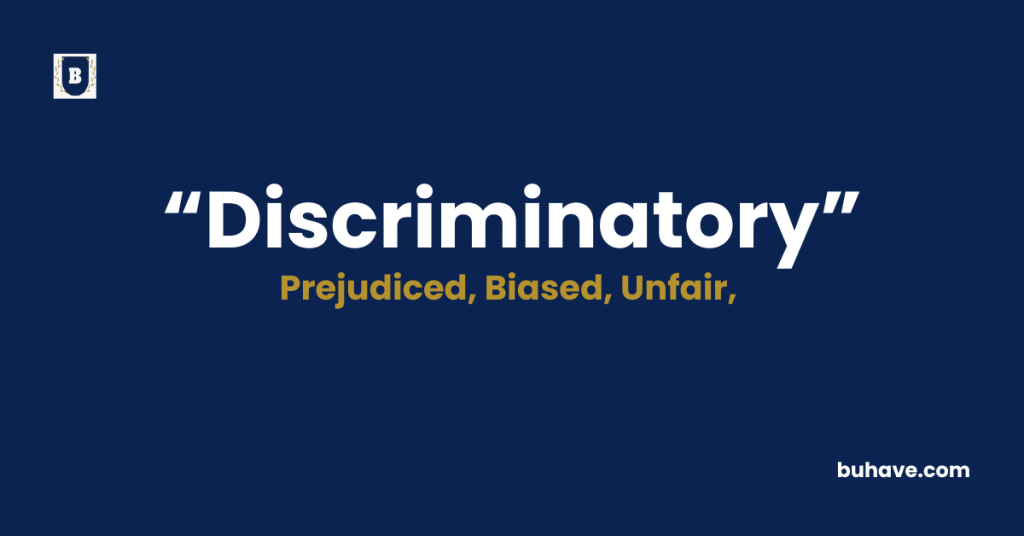The word Discriminatory (Adjective) refers to actions, policies, or attitudes that unfairly differentiate or exclude individuals or groups. In this guide, you’ll learn the full definition, synonyms, antonyms, etymology, and real-life examples of how to use Discriminatory correctly in sentences.
Discriminatory Explained in Depth
A complete and detailed guide to the word Discriminatory including meaning, definition, examples, etymology, synonyms, and antonyms.
Meanings of Discriminatory
Discriminatory means treating someone differently, often unjustly, based on characteristics such as race, gender, age, religion, or disability. It involves biased or unfair distinctions that limit equal opportunity or access.
Definition
Discriminatory refers to behavior, language, policies, or decisions that create inequality by distinguishing people based on unjust or prejudiced reasons. This includes unequal treatment in employment, housing, education, healthcare, or social interactions. The term is often applied to systemic practices or laws that reinforce marginalization, exclusion, or stereotypes. Importantly, not all distinctions are discriminatory only those that result in harm, unfair treatment, or disadvantage. Discriminatory actions may be direct, such as refusing service based on ethnicity, or indirect, like policies that unintentionally exclude certain groups.
The word is commonly used in legal, educational, and workplace settings to identify and address inequality. Societies aiming for fairness strive to identify and eliminate discriminatory practices to promote inclusion and respect for human dignity.
Etymology
The word “discriminatory” is derived from the Latin verb discriminare, meaning “to divide or separate.” It combines dis- (apart) and crimen (judgment or accusation). The root idea was to distinguish or judge between things. In English, “discriminate” originally meant to make distinctions, which could be neutral or positive. However, by the 19th century, the term “discriminatory” evolved to describe unjust or biased distinctions—especially in social, political, or legal contexts. It began to highlight behaviors that unfairly target or exclude people based on identity or background.
Today, “discriminatory” strongly conveys negative implications of inequality, and it plays a key role in civil rights discourse and diversity initiatives worldwide.
Example Sentences
- The company faced legal action for implementing discriminatory hiring practices.
- Discriminatory laws can prevent equal access to education and healthcare.
- It’s important to recognize and challenge discriminatory behavior in daily life.
Discriminatory Synonyms
- Biased
- Prejudiced
- Unjust
- Inequitable
- Exclusionary
- Unfair
- Unequal
- Partisan
- Stereotypical
- Segregative
Discriminatory Antonyms
- Impartial
- Fair
- Equal
- Just
- Inclusive
- Unbiased
- Equitable
- Neutral
- Balanced
- Open-minded
FAQs about Discriminatory
Here’s a FAQ-style guide about the word “Discriminatory”
1. What does discriminatory mean?
It refers to unfair treatment of individuals or groups based on attributes like race, gender, age, or religion.
2. Is all discrimination discriminatory?
No. Only discrimination that results in unfair or harmful treatment is considered discriminatory.
3. Where does discriminatory behavior occur?
It can appear in workplaces, schools, laws, public services, and daily interactions.
4. How can discriminatory policies be challenged?
Through legal action, public advocacy, education, and policy reform.
5. Can discriminatory actions be unintentional?
Yes. Some policies or behaviors may have discriminatory effects even if not meant to harm.

















